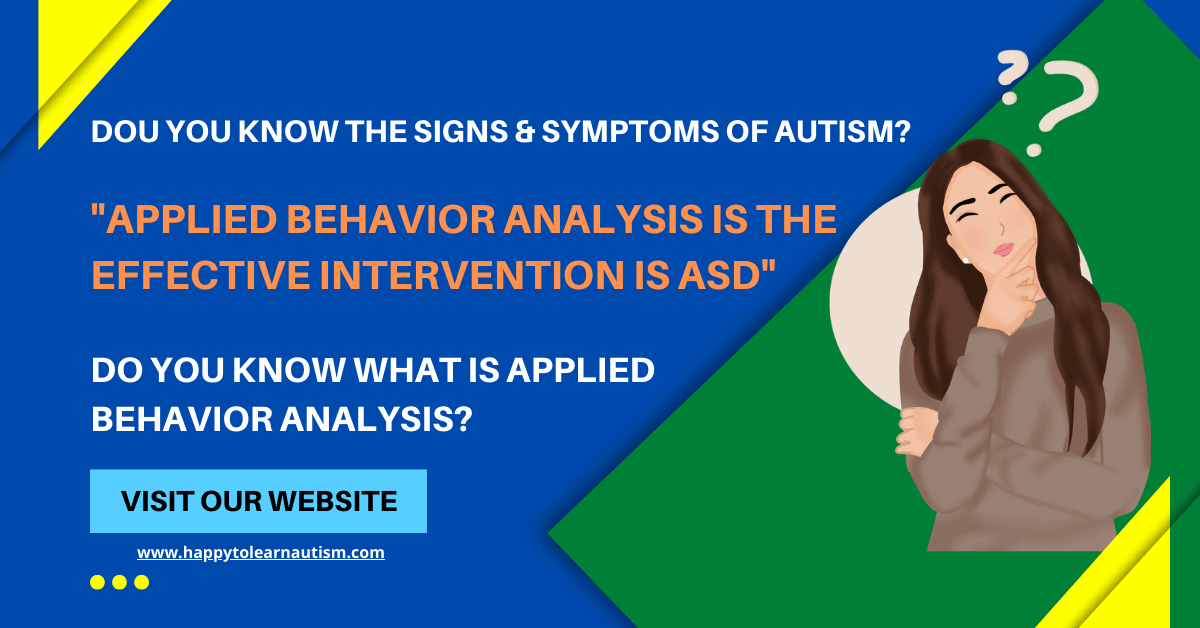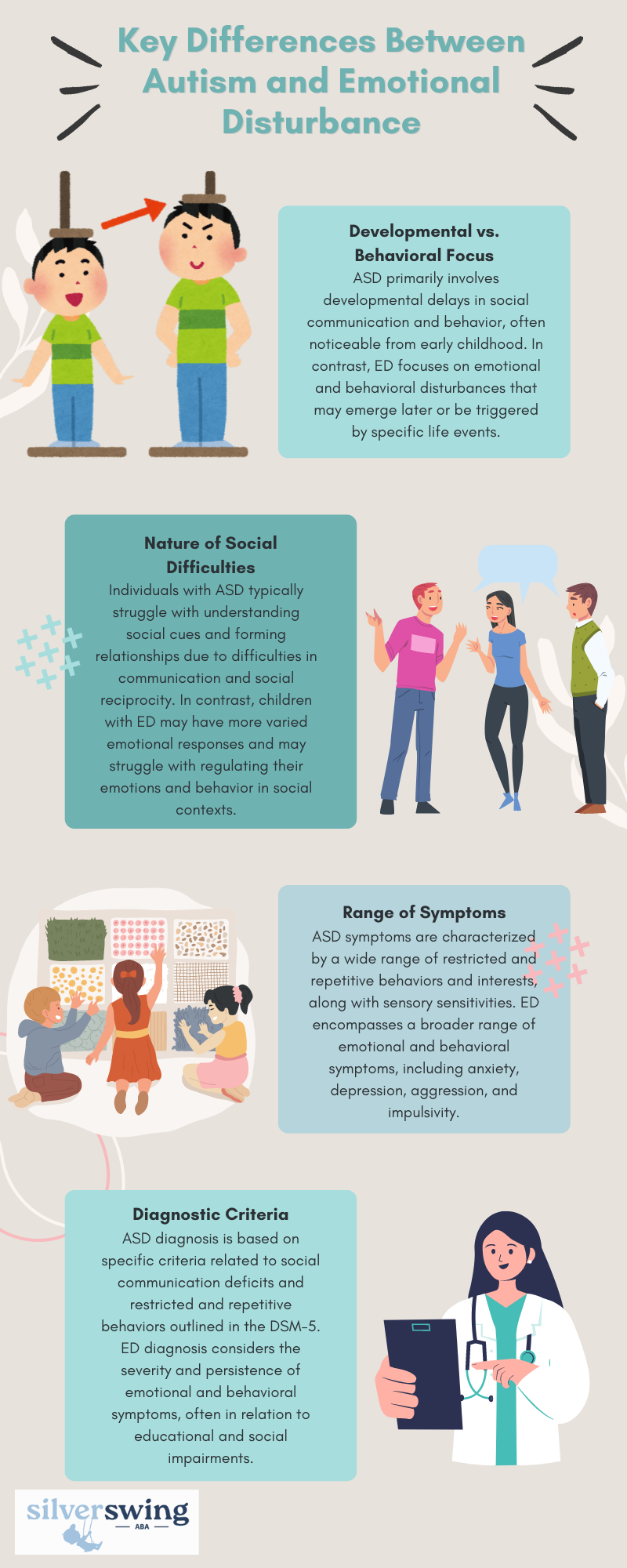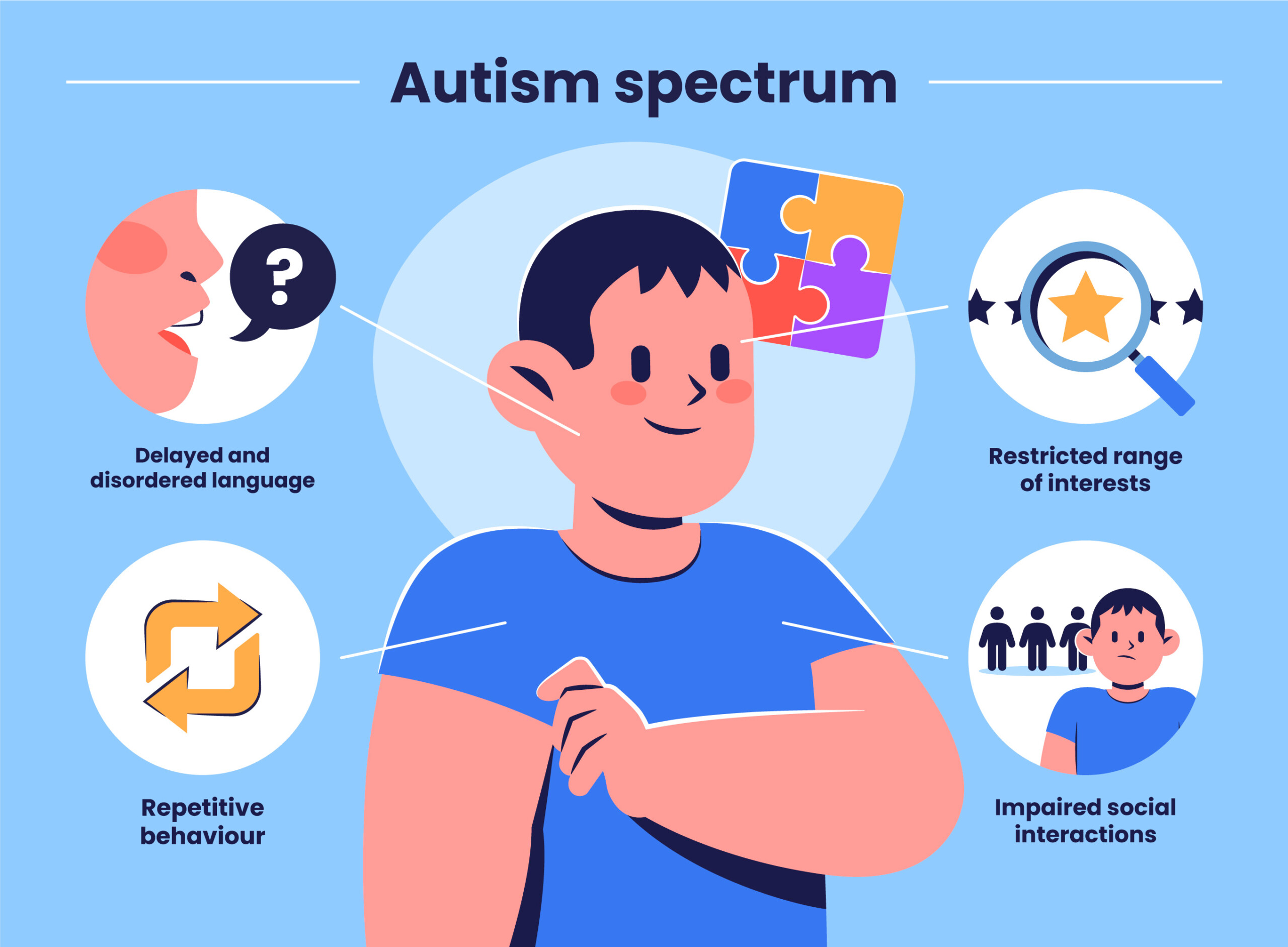Signs it’s time your family needs Autism Behavioral Therapy
Signs it’s time your family needs Autism Behavioral Therapy
Blog Article
Secret Signs and Signs to Acknowledge in People With Behavioral Autism
When you experience somebody with behavioral autism, acknowledging crucial symptoms and signs is crucial. You may see challenges in social interactions and communication, in addition to a solid demand for regimens. Furthermore, sensory level of sensitivities can cause frustrating experiences. Comprehending these attributes can boost your assistance and treatments, yet there's more to discover concerning just how these habits materialize in daily circumstances. Let's explore what these indicators actually resemble.
Obstacles in Social Interactions
When you connect with a person on the autism spectrum, you could observe they deal with social cues and interaction. These challenges can make social interactions feel frustrating for them. You might see them avoiding eye call or standing as well close or also away during discussions, which can develop misconceptions. They may not detect body movement or face expressions, making it harder for them to gauge just how others are feeling.
In addition, you might locate that they prefer regimens and acquainted settings, which can restrict their desire to participate in brand-new social circumstances. When they do involve, they could discuss their rate of interests in fantastic detail without seeing if you're interested. This can lead to one-sided conversations that leave you feeling separated. Comprehending these difficulties can help you approach interactions with empathy and patience, promoting an extra comfy atmosphere for both of you.
Trouble With Verbal and Non-Verbal Communication

Non-verbal communication can be also extra difficult. You could see an absence of eye call or limited use of gestures, which can make communications really feel uncomfortable. Faces may not constantly straighten with the discussion, causing complication regarding their feelings. Identifying these indications is vital, as it aids you much better assistance and engage with individuals on the autism range. By comprehending their interaction challenges, you can cultivate a lot more purposeful links and supply an extra supportive setting.
Repeated Habits and Regimens
Interaction challenges often accompany other signs of autism, such as repeated actions and a solid preference for routines. You may observe that people with autism often participate in details, repetitive activities, like hand-flapping, shaking, or repeating phrases. These behaviors can supply comfort and a sense of control in an usually frustrating world.
Routines are just as crucial; lots of people flourish when they adhere to a structured schedule. You may discover that modifications to these routines can cause considerable distress. If they have a daily routine of consuming morning meal at a particular time or following a certain course to institution, any kind of disruption can trigger anxiety.
Identifying these patterns assists you recognize their actions and offer assistance. By suiting their demand for routine and permitting repeated actions, you can develop a more comfy atmosphere that alleviates their obstacles.
Sensory Level Of Sensitivities

Usual Sensory Triggers
Sensory sensitivities can substantially impact day-to-day life for individuals with autism, as certain stimuli typically set off frustrating reactions. Common sensory triggers consist of loud noises, bright lights, and solid scents. You may observe that sudden sounds, like sirens or alarms, trigger anxiousness or distress. Fluorescent illumination in shops can feel rough and uncomfortable. Structures can additionally play a substantial duty; rough textiles or specific food appearances might be excruciating for you. In addition, crowded locations can overwhelm your senses, making it hard to concentrate or unwind. Recognizing these triggers can aid you manage your atmosphere better. By recognizing what influences you, you can take steps to minimize discomfort and boost your everyday experiences.
Behavior Actions Clarified
Comprehending your behavioral reactions to sensory sensitivities is essential, as they often reveal exactly how you connect with the globe. You may see that specific sounds, lights, or structures bewilder you, resulting in stress and anxiety or pain. When faced with these stimuli, you may withdraw, cover your ears, and even react strongly. These actions aren't simply peculiarities; they're your means of handling overstimulation. You may likewise locate on your own looking for particular sensory experiences, like deep pressure or peaceful environments, to aid ground yourself. Acknowledging these patterns helps you recognize your needs better and can direct exactly how you connect them to others. By recognizing your sensory sensitivities, you can work in the direction of producing an environment that really feels extra workable and comfy for you.
Coping Techniques Overview
Identifying have a peek here your sensory sensitivities is just the initial step; now it's time to explore coping strategies that can help you handle those experiences efficiently. Beginning by creating a sensory toolkit tailored to your needs. This might consist of noise-canceling headphones, fidget playthings, or relaxing scents. Establishing an organized routine can additionally offer predictability, minimizing anxiety around sensory overload. Take breaks in a quiet room to collect yourself when you really feel overloaded. Exercising mindfulness techniques such as deep breathing can assist ground you in the minute. Additionally, connect your needs with those around you; having helpful family and friends can make a massive difference. Keep in mind, discovering what works finest for you may take time, so be open and patient to trying new techniques.
Limited Rate Of Interests and Focus
While lots of people develop a vast array of passions, those with autism often show restricted rate of interests and an intense focus on certain topics. You may notice that someone with autism can spend hours delving right into their favorite subject, whether it's a certain kind of train, a details film, or a scientific idea. This intense emphasis isn't simply a hobby; it can come to be a central component of their identification and social communications.
You might find that discussions revolve around these interests, and they might struggle to engage in wider topics. By comprehending and recognizing these limited passions, you can foster a supportive environment where they really feel valued and understood, enabling for more meaningful connections and communications.
Emotional Law Difficulties
People with autism frequently deal with difficulties in psychological policy, which can be influenced by their extreme focus on certain interests. You might see that when a person is deeply participated in a recommended task, they can experience solid feelings, whether enjoyment or this hyperlink stress. When things do not go as prepared., this intensity in some cases makes it tough for them to shift gears or manage their sensations - Aba Therapist Near Me.

Variability in Developmental Landmarks
When it comes to developing milestones, you'll see that individuals with autism commonly reveal a broad array of irregularity. You could see a kid succeed in language skills yet struggle with social interactions.
It's crucial to identify that each individual's journey is distinct. Observing these patterns can help you recognize their toughness and needs much better.
Regularly Asked Concerns
Exactly How Is Autism Identified in Kid and Adults?
To diagnose autism in adults and youngsters, professionals review behavior, interaction skills, and social communications. They often utilize standard examinations, Going Here interviews, and monitorings to identify if an individual satisfies the requirements for autism range problem.
Are There Various Kinds Of Autism Range Disorders?
Yes, there are various types of autism spectrum conditions, consisting of Asperger's disorder and prevalent developmental disorder-not otherwise specified. Each type varies in extent and attributes, so understanding these distinctions can assist you better support people with autism.
What Therapies Work for People With Autism?
When considering effective therapies for individuals with autism, you'll locate choices like Applied Actions Evaluation, speech treatment, and occupational therapy. Each method can aid boost communication, social skills, and everyday operating tailored to individual demands.
Can Individuals With Autism Lead Independent Lives?
Yes, individuals with autism can lead independent lives. With the appropriate assistance, abilities training, and sources, you can assist them establish self-sufficiency, take care of everyday tasks, and grow in numerous settings, cultivating their self-reliance.
Exactly How Can Family Members Assistance Liked Ones With Autism?
You can sustain your enjoyed ones with autism by producing an organized environment, encouraging their passions, exercising perseverance, cultivating communication, and promoting social abilities. Celebrate their achievements, regardless of just how small, and construct a supportive neighborhood.
Although several people on the autism range can understand and use language, they frequently deal with significant difficulties with both spoken and non-verbal interaction. Recognizing these indicators is essential, as it helps you far better assistance and engage with people on the autism spectrum. You might see that individuals with autism frequently engage in details, repetitive activities, like hand-flapping, shaking, or duplicating expressions.Sensory sensitivities can considerably influence everyday life for individuals with autism, as certain stimuli often activate overwhelming responses.When it comes to developing turning points, you'll notice that individuals with autism frequently show a large array of variability.
Report this page